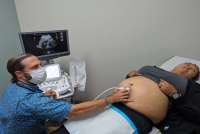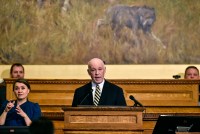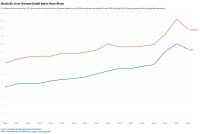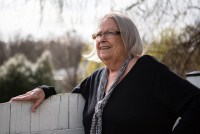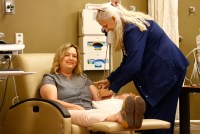Latest KFF Health News Stories
Home Sweet Parking Lot: Some Hospitals Welcome RV Living for Patients, Families, and Workers
Medical and RV industry professionals say hospitals that offer RV parking are easing access to health care for some patients who drive long distances for treatment, like many rural residents.
Giant Health System Almost Saved a Community Hospital. Now, It Wants to ‘Extract Every Dollar.’
A bankruptcy judge will soon decide whether a Central Valley hospital needs to liquidate to repay its creditors. Its largest creditor, St. Agnes Medical Center, is the very entity that backed out of purchasing the Madera Community Hospital last December.
Doctors Created a Primary Care Clinic as Their Former Hospital Struggled
With the community’s help, former co-workers came together to fill gaps in care left by the loss of doctors and departments at a Gallup, New Mexico, hospital.
Congress Considers Easing Regulations on Air Transport of Donated Organs
A little-noticed provision of sweeping legislation to reauthorize the Federal Aviation Administration would make it easier to fly human organs from donor to recipient.
The Painful Legacy of ‘Law and Order’ Treatment of Addiction in Jail
Efforts to improve addiction care in jails and prisons are underway across the country. But a rural Alabama county with one of the nation’s highest overdose rates shows how change is slow, while law enforcement officials continue to treat addiction as a crime rather than a medical condition.
A Plan to Cut Montana’s Medicaid Waiting List Was Met With Bipartisan Cheers. Then a Veto.
Republican Gov. Greg Gianforte’s veto disappointed and bewildered those seeking to address low-income residents’ long wait for assisted living or in-home care.
Excessive Drinking During the Pandemic Increased Alcoholic Liver Disease Death Rates
The number of Californians dying from alcoholic liver disease rose dramatically in the last decade, sped by the pandemic.
Groups Sue to Overturn Idaho ‘Abortion Trafficking’ Law Targeting Teens
It is illegal to help a minor obtain an abortion in Idaho or leave the state for one without parental consent. The lawsuit says the ban infringes on the right to interstate travel and First Amendment freedoms.
Mental Health Respite Facilities Are Filling Care Gaps in Over a Dozen States
As three years of pandemic stress accelerated an ongoing nationwide mental health crisis, peer respite programs diverted patients from overburdened emergency rooms, psychiatric institutions, and behavioral therapists. Now, more “respites” are opening.
Meet the People Deciding How to Spend $50 Billion in Opioid Settlement Cash
As settlement dollars land at the state level, state councils wield significant power in determining how the windfall gets spent. And, though they will likely include the most knowledgeable voices on addiction, these panels also face concerns about conflicts of interest and other issues.
Idaho Drops Panel Investigating Pregnancy-Related Deaths as US Maternal Mortality Surges
Amid a years-long rise in maternal mortality rates in the United States, Idaho lawmakers decided to disband a committee created to investigate pregnancy-related deaths.
‘It Was a Bloodbath’: Rare Dialysis Complication Can Kill, and More Could Be Done To Stop It
A venous needle dislodgment is a rare dialysis complication that can kill a patient in minutes. Some experts worry those who treat themselves at home are at increased risk.
Patients Squeezed in Fight Over Who Gets to Bill for Pricey Infusion Drugs
To drive down costs, insurers are bypassing hospital system pharmacies and delivering high-priced infusion drugs, including some used in chemotherapy, via third-party pharmacies. Smarting from losing out on billing for those drugs, hospitals and clinics are trying to convince states to limit this practice, known as “white bagging.”
More States Legalize Sales of Unpasteurized Milk, Despite Public Health Warnings
Distrust of public health authorities, who say drinking raw milk is dangerous, fuels demand for unpasteurized milk products, leaders on both sides of the issue say.
A New Law Is Supposed to Protect Pregnant Workers — But What If We Don’t Know How?
During pregnancy, workers often face hazardous circumstances, including breathing toxic chemicals. On June 27, the Pregnant Workers Fairness Act began requiring employers to provide “reasonable accommodations.” But the new law has a big hole: Not nearly enough is known about which chemical exposures are dangerous for pregnant workers.
Once-Resistant Rural Court Officials Begin to Embrace Medications to Treat Addiction
As evidence supporting medication treatment for opioid addiction mounts, judges, district attorneys, and law enforcement officials in rural America are increasingly open to it after years of insisting on abstinence only.
The DEA Relaxed Online Prescribing Rules During Covid. Now It Wants to Rein Them In.
Supporters say the proposed rules would balance the goals of increasing access to health care and helping prevent medication misuse. Opponents say the rules would make it difficult for some patients — especially those in rural areas — to get care.
Black, Rural Southern Women at Gravest Risk From Pregnancy Miss Out on Maternal Health Aid
A federal program meant to reduce maternal and infant mortality in rural areas isn’t reaching Black women who are most likely to die from pregnancy-related causes.
Medical Exiles: Families Flee States Amid Crackdown on Transgender Care
As more states restrict gender-affirming care for transgender people, some are relocating to more welcoming destinations, such as California, Illinois, Maryland, and Nevada, where they don’t have to worry about being locked out of medical care.
Doctor Lands in the Doghouse After Giving Covid Vaccine Waivers Too Freely
Richard Coble issued vaccine waivers to patients in at least three states without examining them. He was exposed by a Nashville TV station that bought a waiver for a Labrador retriever named Charlie.





